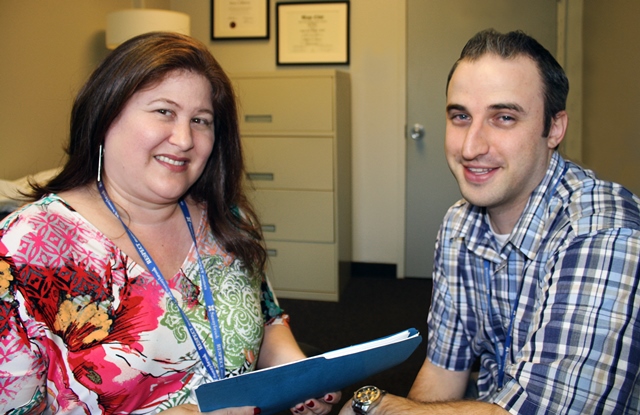
By Natalie Chung-Sayers
She was a pedestrian victim of a car’s collision. After a critical period in emergency then undergoing surgeries to repair broken bones and torn ligaments, she continued her recovery in acute care. A few weeks later she is in a rehabilitation facility. The slower pace helps lessen the intensity of it all. She is moving well, though a sense of hopelessness persists. She no longer participates in therapy and remains withdrawn despite her family’s encouragement. What can be done for her?
“Many patients are recovering from life-changing events. In rehab, they are regaining their mobility and independence, perhaps after experiencing a trauma, severe burns or an acute stroke, but these events can also have an impact on mental health,” says
Dr. Larry Robinson, chief, Rehabilitation Services, St. John’s Rehab Program, Sunnybrook. “We recognized a need and an opportunity in our rehab setting to provide more comprehensive mental health support to those who may need it.”
Psychiatrists Dr. Matthew Boyle and Dr. Rosalie Steinberg of Sunnybrook’s Hurvitz Brain Sciences Program are becoming integrated into inpatient rehab teams at St. John’s Rehab, and are supporting patients through psychiatric consultations and follow-up mental health care.
Psychiatry is not typically embedded in rehab settings in Canada, and St. John’s Rehab is at the forefront of this model. Studies have shown that having active and early involvement of psychiatry services in medical settings can help reduce the length of stay.
“Comprehensive biopsychosocial treatment plans can help patients progress on their path towards recovery in rehab,” says Dr. Boyle.
“These patients may experience mental health conditions such as depression, adjustment disorder, post-traumatic stress disorder, anxiety, dementia, delirium,” he says. “They can also experience exacerbation of existing mental illness secondary to medical issues,” adds Dr. Steinberg.
Suicide prevention: Can we harness social media to help save lives?
Drs. Steinberg and Boyle see about 30 per cent of inpatients at St. John’s Rehab and are gathering data on the benefits of these support services. In particular, they provide specialized mental health care to support patients with trauma or burns who are initially treated at the hospital’s Bayview site.
“Often we can continue treatment plans begun in acute care while collaborating with the rehab teams on adjustments. When patients are ready to leave inpatient rehab, we provide continuity of care, either in follow-up to our outpatient clinics, or through referrals to community resources,” says Dr. Steinberg.
“Psychiatry is not as black and white as other areas of medicine. Over the extended rehab stay, our diagnosis of a patient may change, our understanding of the patient’s presentation may change, and often patients come in with more than one issue. Sometimes a diagnosis will become clear only after acute care has been delivered. By definition, you need two weeks of symptoms to diagnose depression, and a month of symptoms to determine post-traumatic stress disorder. As we typically have a longer length of stay at St. John’s Rehab, it allows us to provide more longitudinal care for patients in starting treatment interventions,” says Dr. Boyle.
The psychiatrists work with the rehab teams to enhance their understanding of potential mental health issues and to help them identify patients who may need support.
As care collaborators, Drs. Boyle and Steinberg also help build therapeutic alliances with the teams to allow for more consistency especially when caring for patients with existing personality and behavioural challenges.
“Also key to a patient’s recovery is the involvement of their family,” adds Dr. Boyle.
Natasha agrees. She is the daughter of a patient at St. John’s Rehab who sought mental health support. “It is very important for family to be supportive – to be there to ask the questions, and to be the advocate for their loved one so they don’t become confused or anxious. It’s also important for patients to be very self-motivated and to advocate for themselves, especially when family members can’t be there.”
“Mental health is a private matter for many. People may not want to talk about it, and respect and discretion are critical to allow conversations to happen. If needed, patients and family members should feel free to ask for more privacy, and opt to move the discussion to an area they feel is suitable,” she adds.
Drs. Boyle and Steinberg are also working to build educational capacity in medical psychiatry by training residents in the provision of psychiatric care in rehab, and will soon pilot a new rotation for non-psychiatry residents.
Natalie Chung-Sayers is a Communications Advisor at Sunnybrook Health Sciences Centre.

